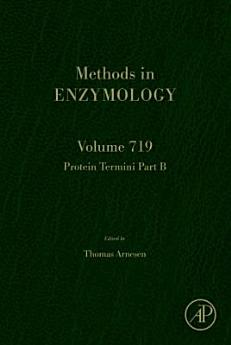Protein Termini Part B
ଲେଖକଙ୍କ ବିଷୟରେ
After completing studies for the A.B., A.M., and Ph.D. degrees in chemistry at Harvard University, David W. Christianson joined the faculty of the University of Pennsylvania, where he is currently the Roy and Diana Vagelos Professor in Chemistry and Chemical Biology. At Penn, Christianson’s research focuses on the structural and chemical biology of the zinc-dependent histone deacetylases as well as enzymes of terpene biosynthesis. His research accomplishments have been recognized by several awards, including the Pfizer Award in Enzyme Chemistry and the Repligen Award in Chemistry of Biological Processes from the American Chemical Society, a Guggenheim Fellowship, and the Elizabeth S. and Richard M. Cashin Fellowship from the Radcliffe Institute for Advanced Study at Harvard University. Christianson is also a dedicated classroom teacher, and his accomplishments in this regard have been recognized by the Lindback Award for Distinguished Teaching at Penn and a Rhodes Trust Inspirational Educator Award from Oxford University. Christianson has also held visiting professorships in the Department of Biochemistry at Cambridge University and the Department of Chemistry and Chemical Biology at Harvard University. Christianson has served with Prof. Anna Pyle as Co-Editor-in-Chief of Methods in Enzymology since 2015.
Dr. Karen N. Allen works at the Department of Chemistry of the Boston University, the Metcalf Center for Science and Engineering
Professor Thomas Arnesen received his Ph.D. in molecular biology from the University of Bergen, Norway in 2006. After postdoctoral work at Haukeland University Hospital and University of Rochester Medical Center, he established his own lab at the University of Bergen in 2010. His main interest has been protein N-terminal acetylation and the responsible enzymes, the N-terminal acetyltransferases (NATs). Using Saccharomyces cerevisiae and human cell models combined with in vitro approaches his lab and collaborators have i) identified and defined the presumed complete cytosolic human NAT-machinery including NATs acting post-translationally, ii) quantitatively analysed the N-terminal acetylomes of yeast and human cells, iii) developed novel assays for NAT-profiling, iv) gained mechanistic insights of the molecular and cellular effects of N-terminal acetylation, v) contributed to the understanding of the physiological and clinical importance of NATs by revealing the links between NatA and cancer cell survival and drug sensitisation, and lately by defining genetic disorders caused by pathogenic NAT variants. The Arnesen lab also contributed to solving the first NAT-structures and developing the first potent NAT-inhibitors. With Fred Sherman and Bogdan Polevoda, Arnesen introduced the NAA (N-alpha acetyltransferase) nomenclature of the N-terminal acetyltransferase genes and proteins, and he acts as the specialist advisor for the HUGO Gene Nomenclature Committee for these genes. Arnesen is one of the founders and council members of the International Society of Protein Termini (ISPT). He has organized several symposia on N-terminal acetylation, and in 2022 he was the head organizer of the EMBO Workshop ‘Protein Termini – From mechanism to biological impact’ in Bergen, Norway. Arnesen has co-authored more than 100 peer-reviewed publications. Today he is head of the Translational Cell Signaling and Metabolism group at the Dept. of Biomedicine, UiB, supported by the Research Council of Norway and ERC. Here his team continues the basic and translational research to understand the impact of protein N-terminal modifications.





